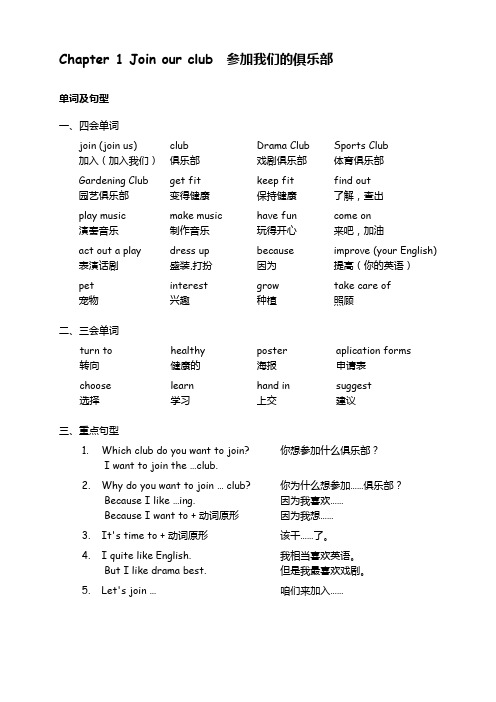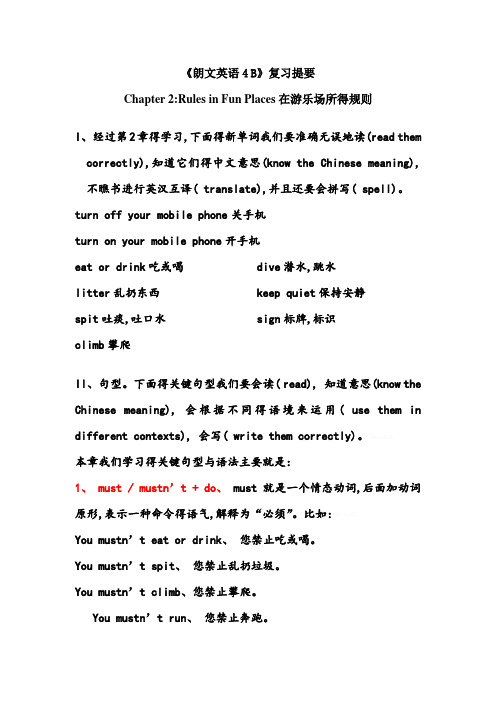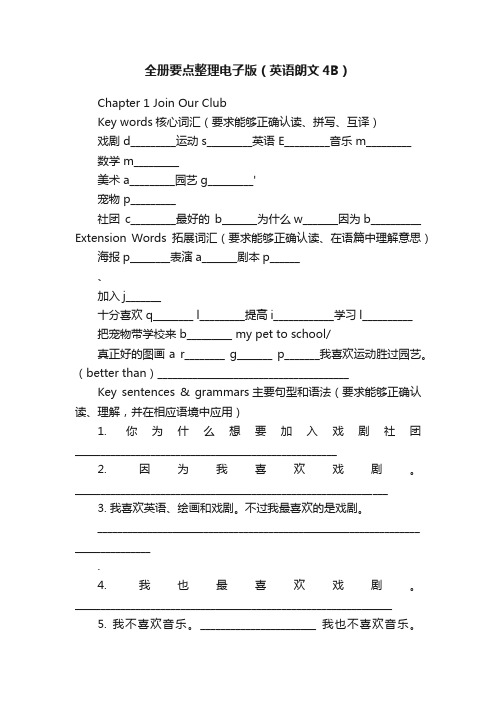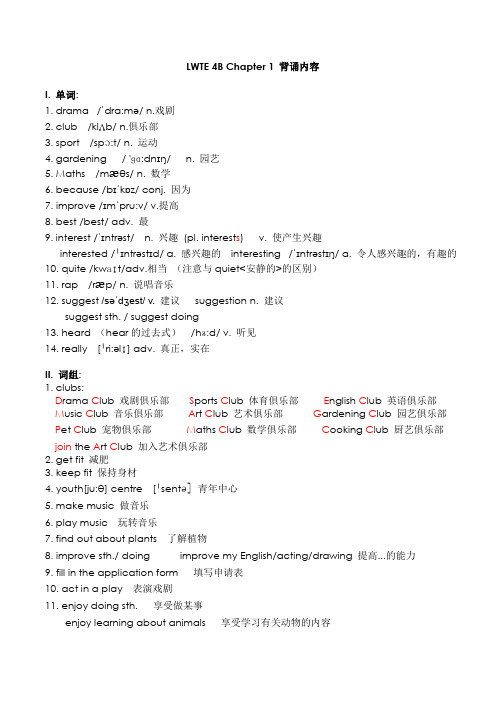香港朗文4B复习提要
(完整版)香港朗文4B复习提要

Chapter 1 Join our club参加我们的俱乐部单词及句型一、四会单词join (join us) club Drama Club Sports Club加入(加入我们)俱乐部戏剧俱乐部体育俱乐部Gardening Club get fit keep fit find out园艺俱乐部变得健康保持健康了解,查出play music make music have fun come on演奏音乐制作音乐玩得开心来吧,加油act out a play dress up because improve (your English) 表演话剧盛装,打扮因为提高(你的英语)pet interest grow take care of宠物兴趣种植照顾二、三会单词turn to healthy poster aplication forms转向健康的海报申请表choose learn hand in suggest选择学习上交建议三、重点句型1. Which club do you want to join? 你想参加什么俱乐部?I want to join the …club.2. Why do you want to join … club? 你为什么想参加……俱乐部?Because I like …ing.因为我喜欢……Because I want to + 动词原形因为我想……3. It's time to + 动词原形该干……了。
4. I quite like English. 我相当喜欢英语。
But I like drama best. 但是我最喜欢戏剧。
5. Let's join …咱们来加入……I. 四会单词Drama Club 戏剧俱乐部Sports Club 体育俱乐部English Club 英语俱乐部Music Club音乐俱乐部Art Club 艺术俱乐部Gardening Club 园艺俱乐部have fun 玩得愉快keep fit 保持健康get fit 变得健康improve 提高join 加入注意:1. get fit 是变健康,是一个变化的过程,而 keep fit 是指在已经健康的情况下,继续保持健康,两者有区别。
最新香港朗文4B第三单元知识要点 词汇语法

LWTE 4B Chapter3背诵内容一、单词:1.Beijing n. 北京Shanghai 上海(注意两者不空格)2.visit /'vɪzɪt/ v./n. 访问,参观,拜访,看望3. will /wɪl/ modal verb(情态动词)将要I will =I’ll She will = She’ll4.exciting /ɪk'saɪtɪŋ/ 令人激动的,使人兴奋的excited 激动的5.Peking opera / 'pi:kɪŋ/ /'ɒp(ə)rə / n. 京剧Peking=Beijing Peking是以前的读法6. forget/fə'ɡet/ v. 忘记7.ceremony /'serəmənɪ/ n. 仪式,典礼8.suggest /sə'dʒe st/ v. 提议,建议n. suggestion /sə'dʒe stʃ(ə)n/9.exhibit / ɪg'zɪbɪt / n.展览10.heritage /'herɪtɪdʒ/ n. 历史遗产二、词组(要求熟练朗读并知晓对应中文名):1.holiday plans in Beijing 北京的假日计划/度假打算2.will visit Beijing soon 将很快参观北京3.enjoy a hike享受远足4.along the G reat W all 沿着长城<专有名词要大写>5.eat Peking duck 吃烤鸭6.at the N ational S tadium (B ird’s N est) 在国家体育馆(鸟巢)<专有名词要大写>7.watch the national flag-raising ceremony 看升国旗仪式8.at Tiananmen Square 在天安门广场(注意此处不加定冠词the)9.take a boat ride 游船10.at the Summer Palace 在颐和园11.look at the exhibits 看展览12.at the Palace Museum 在故宫博物馆13.great news 好消息e to Beijing for a holiday 来北京度假12.arrive on Sunday 周日到达arrive this Sunday 本周日到达13.arrive in Beijing 到达北京14.have some free time to do sth. 有一些空闲时间(有空)去做某事15.show sb. around 带某人参观16.do some exciting things 做一些令人激动的事17.can’t wait to do 迫不及待做某事18.make sense 有意义,讲得通,有道理,符合逻辑19. a day out in Beijing 北京一日游20.suggest an interesting trip for a day out 为一天游建议一个有趣的旅行21.Heritage Tour 历史遗产游22.Cultural Tour 人文游23.pick sb. up 接某人24.stroll along the lake in Beihai Park 沿着北海公园的湖散步25.practise tai chi 练太极26.see many interesting sculptures 看很多有趣的雕塑27.visit the Palace Museum 参观故宫28.see some temples 看寺庙29.look at the palaces and exhibits 观赏宫殿和展品30.drink tea 喝茶其他北京地名或景点名(只要求会朗读):Olympic Forest Park奥林匹克森林公园Wangfujing Snack Street 王府井小吃街The Temple of Heaven 天坛China Printing Museum 中国印刷博物馆Beijing Traditional Opera Museum 北京传统京剧博物馆798 Art District 798 艺术区Beihai Park北海公园Laoshe Teahouse 老舍茶馆三、句子:1.Where will you go in Beijing? 在北京你将会去哪里?2.I’ll go to the Great Wall. 我会去长城。
最新香港朗文4B第五单元知识要点 词汇语法

朗文4B Chapter5背诵内容一、单词1. spaghetti /spəˈgetɪ/ n. 意大利面(pasta的一种)2.pasta /'pɑːstə//ˈpæstə/ n. 意大利面3.Italy /'ɪtəlɪ/ n. 意大利4.America /ə'merɪkə/ n. 美国5.France /frɑ:ns/ n. 法国French /frentʃ/ n. 法国的6. Japan /dʒəˈpæn/ n. 日本7. China /ˈtʃaɪnə/ n. 中国8. snail /sneɪl/ n.蜗牛9.hamburger /ˈhæmbɜ:gə/ n. 汉堡包10.pizza /ˈpi:tsə/n.披萨11.bread /bred/n. 面包12.spicy /ˈspaɪsɪ/ adj. 辣的13.roast /rəʊst/ adj. 烤好的,烤制的14. fair/ feə /n. 集市,庙会;展览会15. stall /stɔːl/n. 货摊16. delicious /dɪ'lɪʃəs/ adj. 美味的,可口的17. Thailand /'taɪlænd/ n. 泰国18. crunchy /'krʌntʃɪ/ adj. 脆的,吃上去嘎吱嘎吱的19. offer /ˈɒfə/ v. 提供,给予20. satay /ˈsɑ:teɪ/ n. (马来西亚、印度尼西亚的)加香烤肉;沙嗲21. Malaysia / mə'leɪʒə/ n. 马来西亚22. Africa /'æfrɪkə/ n. 非洲23. frighten /'fraɪtn/ v. 惊吓24.India /'ɪndɪə/ n. 印度25.curry /ˈkʌrɪ/ n. 咖喱食品26.sushi /ˈsu:ʃɪ/ n. 寿司,生鱼片冷饭团;27.treat /triːt/ n. 款待、招待kshake /ˈmɪlkʃeɪk/ n. 奶昔29.prawn /prɔ:n/ n. 对虾二、词组1.at the International Food Festival 在国际食品节2.food from around the world=food from all over the world世界各地的美食3.be made from…由……制作(化学变化, 不能看到材料本身)be made of…由……制作(物理变化,能看到材料本身)be made in …在……生产4.hot dog 热狗5.roast duck 烤鸭6.dim sum 点心7.cold noodles 冷面8.French bread 法式面包9.soy sauce 酱油/sɔɪ/ /sɔːs/10.a bread roll 一只面包卷11.a food fair 一场食品博览会12.taste new kinds of food 品尝新款食物13.at a stall 在一个摊位上14.honey pot ants 蜜罐蚂蚁15.South America 南美16.go to another stall 去另一个摊位17.fried grasshopper 油炸蚱蜢18.have a really interesting time 玩得很高兴,度过美妙的时光19.at the fair 在集市上20.get home=arrive home 到家21.tell their mother about the insects 告诉他们妈妈关于昆虫的事22.buy sb. a present=buy a present for sb. 为某人买一件礼物23.look a bit worried 看上去有一些焦虑24.a can of worms 一罐蠕虫25.frighten her mother 惊吓她的妈妈26.food items /'aɪtəm/ 食物. 食品27. a food court 美食广场28. chicken curry 咖喱鸡29. picky eater 挑食的人30. sandwiches made with ham 火腿制成的三明治三、重点语法1.--Shall we try some spaghetti/ hot dogs/…?--Good idea. / Sorry.shall是情态动词,用在问句中,用来征询对方对于主语行动的意见,如要求对方提供帮助、提出建议或给予指示和征求意见, 主要用于第一(I和We)人称。
4B Chapter 6复习提要

《朗文英语4 B》复习提要Chapter 6:Ordering food 点餐(order为动词,但动词作题目或主语时常用动名词形式)I. 经过第6章的学习,下面的新单词我们要准确无误地读(read them correctly),知道它们的中文意思(know the Chinese meaning),不看书进行英汉互译( translate),并且还要会拼写( spell)。
order food点餐restaurant餐厅I’d=I wouldfavourite(英式)=favorite(美式)最喜欢的a piece of 一片…, 一张…,一块…a can of 一罐…a cup of一杯…a tin of 一听…a glass of 一玻璃杯…a plate of 一盘…,一碟…a bowl of 一碗…two piece s/ bottle s/ tin s/ can s/ cup s/ glass es/ plate s/ bowl s of…两块…/ 两瓶…/ 两听…/两罐…/ 两杯…/ 两玻璃杯…/ 两盘…/ 两碗…注意:1.tea和juice是不可数名词,前面加上另外一个名词一起构成复合名词,但组合后的名词仍然是不可数名词,如lemon tea, apple juice。
需要注意的是前面的名词必须使用单数形式。
例如:orange juice(橙子汁),water melon juice(西瓜汁),snake soup(蛇汤),lemon juice(柠檬汁)。
2.量词短语可以加在可数与不可数名词前,如a piece of 一片…, 一张…, 一块…/ a can of 一罐…/ a tin of 一听…/ a cup of一杯…/ a glass of 一玻璃杯…/ a plate of 一盘…,一碟…/ a bowl of 一碗…等。
当超过数量1时可使用其复数形式two piece s/ bottle s/ tin s/ can s/ cup s / glass es / plate s / bowl s of…两块…/ 两瓶…/ 两听…/ 两罐…/ 两杯…/ 两玻璃杯…/ 两盘…/ 两碗…量词的短语后面可直接加不可数如two piece s of bread, three cup s of hot chocolate;如果加可数名词需要用复数形式表达,如three plate s of fried noodle s, ten bowl s of won ton noodle s.II.句型。
4B Chapter 2复习提要

《朗文英语4 B》复习提要Chapter 2:Rules in Fun Places在游乐场所得规则I、经过第2章得学习,下面得新单词我们要准确无误地读(read them correctly),知道它们得中文意思(know the Chinese meaning),不瞧书进行英汉互译( translate),并且还要会拼写( spell)。
turn off your mobile phone关手机turn on your mobile phone开手机eat or drink吃或喝litter乱扔东西spit吐痰,吐口水climb攀爬dive潜水,跳水keep quiet保持安静sign标牌,标识II、句型。
下面得关键句型我们要会读( read), 知道意思(know the Chinese meaning), 会根据不同得语境来运用( use them in different contexts), 会写( write them correctly)。
本章我们学习得关键句型与语法主要就是:1、 must / mustn’t + do、must 就是一个情态动词,后面加动词原形,表示一种命令得语气,解释为“必须”。
比如:You mustn’t eat or drink、您禁止吃或喝。
You mustn’t spi t、您禁止乱扔垃圾。
You mustn’t climb、您禁止攀爬。
You mustn’t run、您禁止奔跑。
You mustn’t dive、您禁止潜水(跳水)。
2、 No + doing,表示“禁止”。
这样得句子经常出现在公共场合得标语,用来警示她人。
比如:No eating or drinking、=You mustn’t eat or drin k、禁止吃或喝。
No spitting、=You mustn’t spit、禁止乱扔东西。
spit 要双写词尾‘t’,再加‘ing’、No climbing、=You mustn’t climb、禁止攀爬。
全册要点整理电子版(英语朗文4B)

全册要点整理电子版(英语朗文4B)Chapter 1 Join Our ClubKey words核心词汇(要求能够正确认读、拼写、互译)戏剧 d_________运动 s_________英语 E_________音乐 m_________数学 m_________美术 a_________园艺 g_________'宠物 p_________社团c_________最好的b_______为什么w_______因为b__________ Extension Words拓展词汇(要求能够正确认读、在语篇中理解意思)海报p________表演a_______剧本p______、加入j_______十分喜欢 q________ l_________提高i____________学习l__________把宠物带学校来 b_________ my pet to school/真正好的图画a r________ g_______ p_______我喜欢运动胜过园艺。
(better than)______________________________________Key sentences & grammars主要句型和语法(要求能够正确认读、理解,并在相应语境中应用)1. 你为什么想要加入戏剧社团____________________________________________________2. 因为我喜欢戏剧。
______________________________________________________________3. 我喜欢英语、绘画和戏剧。
不过我最喜欢的是戏剧。
________________________________________________________________ _______________.4. 我也最喜欢戏剧。
_______________________________________________________________5. 我不喜欢音乐。
全册要点整理电子版(英语朗文4B)

全册要点整理电子版(英语朗文4B)Introduction:The following article provides a comprehensive overview and summary of the key points covered in the English textbook "Look, Listen, and Learn 4B". This electronic version aims to present the essential information in a concise and organized manner.Unit 1: Famous PeopleIn this unit, students are introduced to famous historical figures and their significant achievements. The chapter covers people such as Leonardo da Vinci, Albert Einstein, and Amelia Earhart. It emphasizes the importance of perseverance, creativity, and dedication in making a difference in the world. Moreover, it encourages students to explore their own interests and passions.Unit 2: Travel and AdventureUnit 2 focuses on various travel experiences and adventures. Students encounter different types of transportation and learn about famous landmarks around the world. The unit also covers different cultural practices and customs in various countries, promoting cultural awareness and understanding. It inspires students to appreciate the beauty of diversity and explore the world.Unit 3: The Natural WorldThis unit explores the wonders of the natural world, including different ecosystems, animals, and plants. Students learn about environmental issues and the importance of protecting our planet. It encourages students todevelop an appreciation for nature and take action to contribute to a sustainable future.Unit 4: CommunicationUnit 4 delves into effective communication skills, both verbal and non-verbal. Students learn about different forms of communication, such as writing, speaking, and listening. The chapter also emphasizes the significance of good manners and respectful behaviors in interpersonal interactions. It aims to nurture students' communication abilities and enhance their social skills.Unit 5: Inventions and DiscoveriesThis unit focuses on significant inventions and scientific discoveries throughout history. Students explore technological advancements and their impact on society. They also learn about the process of scientific inquiry and innovation. The unit encourages critical thinking and problem-solving skills.Unit 6: Health and FitnessUnit 6 promotes a healthy lifestyle and physical fitness. Students learn about the importance of balanced nutrition, exercise, and personal hygiene. The chapter also addresses the effects of unhealthy habits and encourages students to make positive choices for their well-being. It aims to instill healthy habits at a young age.Unit 7: Our Changing WorldIn this unit, students discuss the rapid changes happening in the world, including advancements in technology and globalization. They examine thebenefits and challenges brought about by these changes. The chapter encourages students to adapt to a changing world while preserving their cultural heritage and values.Conclusion:The electronic version of the key points in the English textbook "Look, Listen, and Learn 4B" provides a concise summary of the essential content covered in each unit. It aims to facilitate revision and serve as a valuable resource for students. By studying these units, students will not only enhance their English language skills but also broaden their knowledge and perspective on various topics.。
最新香港朗文4B第一单元知识要点 词汇语法

LWTE 4B Chapter 1 背诵内容I. 单词:1. drama /ˈdra:mə/ n.戏剧2. club /klʌb/ n.俱乐部3. sport /spɔ:t/ n. 运动4. gardening / 'ɡɑ:dnɪŋ/ n. 园艺5. Maths /mæθs/ n. 数学6. because /bɪˈkɒz/ conj. 因为7. improve /ɪmˈpru:v/ v.提高8. best /best/ adv. 最9. interest /ˈɪntrəst/ n. 兴趣(pl. interest s) v. 使产生兴趣interested /ˈɪntrəstɪd/ a. 感兴趣的interesting /ˈɪntrəstɪŋ/ a. 令人感兴趣的,有趣的10. quite /kw aɪt/adv.相当(注意与quiet<安静的>的区别)11. rap /ræp/ n. 说唱音乐12. suggest /səˈdʒest/ v. 建议suggestion n. 建议suggest sth. / suggest doing13. heard (hear的过去式)/hɜ:d/ v. 听见14. really [ˈri:əlɪ] adv. 真正,实在II. 词组:1. clubs:D rama C lub 戏剧俱乐部S ports C lub 体育俱乐部E nglish C lub 英语俱乐部M usic C lub 音乐俱乐部A rt C lub 艺术俱乐部G ardening C lub 园艺俱乐部P et C lub 宠物俱乐部M aths C lub 数学俱乐部C ooking C lub 厨艺俱乐部join the A rt C lub 加入艺术俱乐部2. get fit 减肥3. keep fit 保持身材4. youth[ju:θ] centre [ˈsentə]青年中心5. make music 做音乐6. play music 玩转音乐7. find out about plants 了解植物8. improve sth./ doing improve my English/acting/drawing 提高...的能力9. fill in the application form 填写申请表10. act in a play 表演戏剧11. enjoy doing sth. 享受做某事enjoy learning about animals 享受学习有关动物的内容12. take better care of my pet 更好照顾我的宠物13. paint a good picture of my dog 画一幅我的狗的好画14. bring my pet to school 带我的狗去学校15. like pets most of all 最喜欢宠物16. hand in 上交17. dress up 穿上盛装18. grow some beautiful plants 种一些漂亮的植物19. quite like 相当喜欢(程度弱于like … very much)20. like music best 最喜欢音乐21. come on 加油;快来22. time to do\ time for doing 到了要…的时候了time to choose a club to join 到了要选择参加一个俱乐部的时间了23. these posters of different clubs 不同俱乐部的海报24. want to be the best pet owner 想成为最棒的宠物主人III. 重点句型:1. Which club do you want to join? 你想加入哪个俱乐部?2. Why do you want to join the …? Because… 你为什么想加入……?因为……3. Why not? 为什么不?4. I don’t like music. He doesn’t like music either. 我不喜欢音乐。
- 1、下载文档前请自行甄别文档内容的完整性,平台不提供额外的编辑、内容补充、找答案等附加服务。
- 2、"仅部分预览"的文档,不可在线预览部分如存在完整性等问题,可反馈申请退款(可完整预览的文档不适用该条件!)。
- 3、如文档侵犯您的权益,请联系客服反馈,我们会尽快为您处理(人工客服工作时间:9:00-18:30)。
Chapter 1 Join our club参加我们的俱乐部单词及句型一、四会单词join (join us) club Drama Club Sports Club加入(加入我们)俱乐部戏剧俱乐部体育俱乐部Gardening Club get fit keep fit find out园艺俱乐部变得健康保持健康了解,查出play music make music have fun come on演奏音乐制作音乐玩得开心来吧,加油act out a play dress up because improve (your English) 表演话剧盛装,打扮因为提高(你的英语)pet interest grow take care of宠物兴趣种植照顾二、三会单词turn to healthy poster aplication forms转向健康的海报申请表choose learn hand in suggest选择学习上交建议三、重点句型1. Which club do you want to join? 你想参加什么俱乐部?I want to join the …club.2. Why do you want to join … club? 你为什么想参加……俱乐部?Because I like …ing.因为我喜欢……Because I want to + 动词原形因为我想……3. It's time to + 动词原形该干……了。
4. I quite like English. 我相当喜欢英语。
But I like drama best. 但是我最喜欢戏剧。
5. Let's join …咱们来加入……复习提要I. 四会单词Drama Club 戏剧俱乐部Sports Club 体育俱乐部English Club 英语俱乐部Music Club音乐俱乐部Art Club 艺术俱乐部Gardening Club 园艺俱乐部have fun 玩得愉快keep fit 保持健康get fit 变得健康improve 提高join 加入注意:1. get fit 是变健康,是一个变化的过程,而 keep fit 是指在已经健康的情况下,继续保持健康,两者有区别。
2. make music 做音乐,指的是写词,编曲这一类歌曲创作的行为。
3. play music 玩音乐,还可以指弹奏具体的乐器;比如 play the piano, play the violin, play therecorder 等等。
(☆ 具体乐器前,要加定冠词 the)4. gardening 园艺(名词);improve one’s English 提高某人的英语;painting and drawing 绘画(动名词,是两件事情)5. English Club, Art Club, Sports Club, Dancing Club 等都是专有名词,首字母要大写。
同样的比如店名,商品牌子,月份和星期等等。
II. 句型why 引导的疑问句,表示询问原因,一般用只能用 because 引导的句子回答。
如:1. Why do you want to join the Drama Club?为什么你想加入戏剧俱乐部?Because I like drama.因为我喜欢戏剧。
2. Why are you late?你为什么迟到?Because I met the accident.因为我遇上车祸了。
3. Why does she want to join the Drama Club?为什么她想加入戏剧俱乐部?Because she likes drama and she wants to act in Cinderella.因为她喜欢戏剧,她想演灰姑娘。
4. Why did they want to join the English Club last year? 他们去年为什么想加入英语俱乐部?Because they liked speaking English and wanted to improve English.因为他们喜欢说英语,想提高英语水平。
III. 短语1. want to do (动词原形) 想要做… /2. Like (enjoy) +名词/doing (动名词) 喜欢做…(名词或动名词)2. it’s time to do sth = it’s time for sthIt’s time to go to school. = It’s time for school. 3. I quite/really like … , but I like … best. 非常喜欢… , 但更喜欢…IV. 拓展特殊疑问句:用疑问词引导的疑问句叫做特殊疑问句。
疑问词分为三类:疑问代词: what, which, whose, who, whom疑问形容词:what (which,whose) + 名词疑问副词: when, where, why, how疑问代词的用法1. what 引导的疑问句: 此类疑问句可以对主语、表语和宾语提问。
A. 对主语提问What is in your pocket?(What's in your pocket?)你口袋里有什么?☆ 这个问题可以有两种回答:a:There is an egg in it. 在口袋里有一个蛋。
b:An egg is(in it).一个蛋(在里面)。
B. 对宾语提问What did you buy?你买了什么?I bought a bike.我买了辆自行车。
C. 对表语提问What is this?这是什么?It's a bench.这是一条长凳。
What is your mother?你妈妈是干什么的?She is a teacher.她是个老师。
☆ What is+人?此句型是问人的职业,一般译为“是干什么的?”2. Who (whom),whose,which 引导的疑问句:此类疑问句可以对主语和宾语提问。
Who broke the window?(对主语提问)谁打破了窗户? Li Ming did. 李明打破的Who is that woman?(对表语提问)那个女人是谁?She is my mother. 她是我妈妈。
或者:She is Rose. 她是罗思。
☆ Who is+人?是询问某人的姓名或与人关系的问句。
与What is+人?(问人的职业)不同。
Whom (Who) did you give the book to? (介词宾语)你把这本书给谁了?To whom did you give the book to?☆ whom 是 who 的宾格,whom 只能出现在从句里或是介词(如 to, from, at, of..)后。
Whose is this umbrella?这伞是谁的?This umbrella is my sister's. 这伞是我姐姐的。
☆ whose 之后如果没有名词时,表示“谁的(东西)……”。
Which is Tom's?(对主语提问)哪个是汤姆的?This is his.这是他的。
Which does he want?(对宾语提问)他想要哪一个?He wants the green one. 他想要那个绿色的。
☆ 疑问词 what,who,which 在句中作主语时,语序是陈述句语序。
疑问形容词的用法what,which,whose 后面跟上名词时,这三个疑问词起形容词作用。
What sports do you like?(对宾语提问)你喜欢什么运动?I like basketball. 我喜欢篮球。
Whose pens are these?(对表语提问)这些是谁的钢笔?They are Li Ming's. 这些是李明的。
Whose father died two years ago?(对主语提问)两年前谁的父亲死了?Which picture did you take?(对宾语提问)哪一张照片是你拍的?I took the one on the right. 右边的那一张是我拍的。
疑问副词的用法1. when 引导的疑问句:询问时间When were you born?你何时出生?(I was born)on June 5, 1962.我是1962年6月5日出生的。
When will you go to Japan?你什么时候去日本?Next year. 我明年去那儿。
☆ when 引起的疑问句,都可用简略式回答,只回答出时间就可以了。
when 问的是具体时间,所以不能和完成时连用。
(×)When have you been here?(○)How long have you been here?你呆在这里有多久了?(○)When did you come here?你什么时候来这里的?2. where 引导的疑问句:询问地点、场所Where do you live?你住在哪儿?(I live in)Beijing. 我住在北京。
Where are you going?你准备去什么地方? I am going to Japan. 我准备去日本。
3. why 引导的疑问句:询问原因,它的回答只能用 because 引导的原因状语从句。
Why are you late?你为什么迟到? Because I met the accident. 因为我遇上车祸了。
Why didn't you see the movie? / Why did you not see the movie?你为什么不去看那部电影?Because I had seen it before. 因为我已经看过了。
4. how 引导的疑问句,可分为两类:a. "How…?" how 可单独地置于疑问句的句首。
询问如何地做某事即做某事的方法、手段及健康、天气……How do you go to school?(问方式) I go to school by bus. 我坐公共汽车。
How are you?(问健康)你身体怎样? I'm fine. Thank you!我很好。
谢谢你。
How is the weather today?/ What is the weather like today?今天天气如何?It's cloudy. 今天多云。
b. How + 形容词(副词)+ ~~?(询问年龄、身高、数量、次数、距离等)How old is the bridge? 这座桥有多少年代了?How + 形容词 + 主语 + 谓语!(how 引导的感叹句)How beautiful the flowers are! 这些花是多么美丽呀!Chapter 2 Rules in fun places在游乐场所的规则单词及句型一、四会单词rule turn off must (mustn’t)keep quiet sign规则关掉必须(禁止)保持安静标牌Litter (No littering) spit (No spitting) dive (No diving) drive 扔垃圾(禁止扔垃圾)吐痰(禁止吐痰)跳水(禁止跳水)驾驶No running light a fire rock pick flowers spoil 禁止奔跑生火岩石摘花损坏二、三会单词attendant country park in motion arrive接待员郊野公园移动到达hill view peaceful bench小山景色平静的长椅radio car flush shoplifting keep off遥控车冲(厕所)在商店偷窃不要接近shine run up to in case of good try照耀跑过来如果干得好mobile phone have to stop doing have a good time 手提电话必须停止做玩得高兴三、重点句型1. No + doing 公共场合的标语,用来警示他人。
